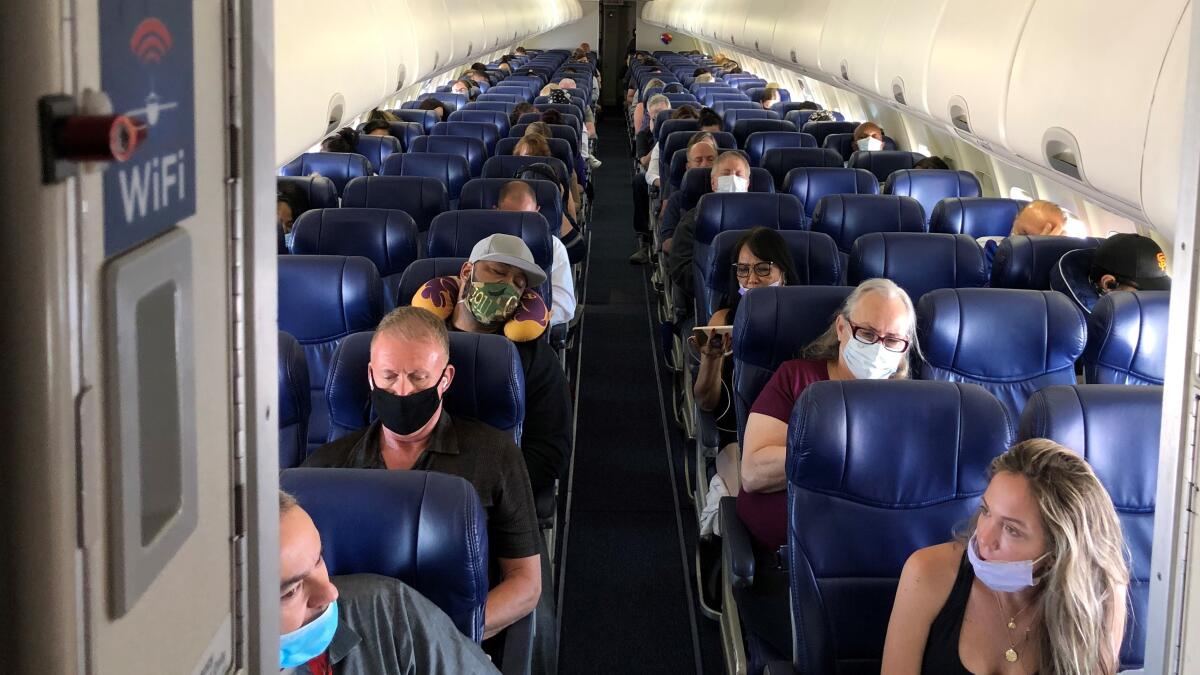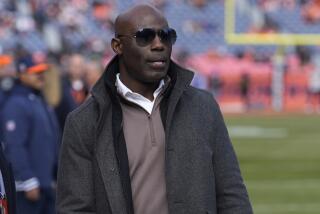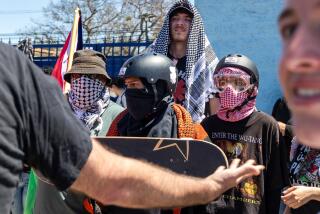Column: The jerk next to me on the plane wouldn’t wear a mask. Here’s why I didn’t do anything

- Share via
The man sitting next to me on the plane was not wearing his mask.
Everyone else — every single person I saw — was following the rules. This guy, though, was an American, middle aged, flying back to L.A. from Frankfurt, Germany. His mask was down around his neck.
I ignored him for the first half-hour or so, but finally, nervous about sitting for 12 full hours next to an unmasked man during a pandemic, I asked if he would put it on. I swear I was very polite. Apologetic even.
He ignored me. I asked again, and he finally looked at me and angrily told me that if I wanted him to wear a mask, I would have to get the flight attendant to tell him. He wasn’t going to take orders from me, he said.
So I got up and spoke to the flight attendant, who told him he was required to keep it on — covering both his mouth and nose — for the entire flight. But as soon as she walked away, he pulled it down again, sneered at me, and for the rest of the flight he wore it under his nose.
I said nothing more to him for the remaining 11 hours. I was actually afraid he might become violent if I persisted.
From what I now understand, that may have been a wise decision. Air rage is at an all time high.
According to the Federal Aviation Administration, there have been 4,626 complaints about unruly passengers made so far this year by flight crews. Of those, 3,366 were mask-related. Sara Nelson, the international president of the Assn. of Flight Attendants, says that at this rate there will be more incidents in 2021 than in any other year in the history of aviation.
And numbers tell only part of the story. Testimony before a recent hearing of the House Aviation Subcommittee described passengers biting, kicking, punching, throwing trash and food, and screaming racial epithets and slurs. One passenger, angry about the mask requirement, urinated on a lavatory floor; several punched other passengers in the face, according to the FAA. In some cases, passengers followed crew members out through the airport, taunting or threatening them.
A guy on a New Jersey-to-California flight — just one of many examples — was fined $42,000 in May after refusing to wear a mask, “making non-consensual physical contact with another passenger,” throwing a playing card at a passenger, making stabbing gestures toward passengers and “snorting what appeared to be cocaine from a plastic bag.” He “became increasingly agitated” and the crew “equipped themselves with flex cuffs and ice mallets.” The plane diverted to Minneapolis, where it was met by law enforcement.
Just another day at work!
In a July survey, 85% of flight crew members said they had dealt with unruly passengers during 2021; 58% said they had done so five or more times. Nearly 1 in 5 had “experienced physical altercations.” Six out of 10 said passengers had used racist, sexist or homophobic slurs.
Unsurprisingly, many of the incidents involve both hostility to the mask mandates and excessive alcohol consumption.
“I’ve lost count of the times I’ve been insulted or threatened on a flight simply for doing my job,” said Teddy Andrews, an American Airlines flight attendant, in his testimony to the subcommittee. He described an altercation in which a man who refused to wear a mask called him a racist slur.
It goes without saying that disruptive events that take place thousands of feet in the air carry a special safety risk.
The FAA in January declared a “zero-tolerance policy” for unruly behavior. Among other things, it is no longer offering people warning notices or counseling if they’re found to have behaved inappropriately. The agency is empowered to mete out fines of up to $37,000 per violation. This year it has imposed more than $1 million in fines.
Passengers can also be prosecuted criminally.
Delta Air Lines recently suggested that all airlines should share their “no-fly lists” of unruly passengers. These are people who are banned from flying on one carrier because they’ve behaved badly. In the past, that hasn’t been such a big deal because they can fly instead on other carriers. Sharing the lists could prevent that, although it raises privacy and antitrust issues.
Frankly, I’ve got little sympathy for people who won’t follow the mask rules. They should not be allowed to fly until they can comply.
The guy next to me wasn’t drunk, as far as I could tell. He was just a nasty piece of work, soused or sober.
But I don’t want to sound too holier-than-thou. I’ve been known to be unruly myself. I believe in the right to talk back, peaceably, to authority. Even while flying.
I once got into an altercation on a flight after crossing — unknowingly — from coach into business class to throw a banana peel in the nearest galley garbage can. Whew, the flight attendant was mad. How dare I enter the preserve of people who’d paid more for their tickets than I had! She wasn’t polite and neither was I. I even refused to tell her my seat number and stormed away. After hearing about Teddy Andrews’ experiences, I’ll try to be nicer in the future.
Still, there’s something especially bad about a half-wit who defies the nation’s health and safety laws inches away from you, for hours on end, in the middle of a pandemic that has killed over 4.5 million people. That’s worse than chucking a banana peel in the rich people’s galley, isn’t it?
If I knew my seatmate’s name, I’d wholeheartedly recommend him for a worldwide no-fly ban.
More to Read
A cure for the common opinion
Get thought-provoking perspectives with our weekly newsletter.
You may occasionally receive promotional content from the Los Angeles Times.











